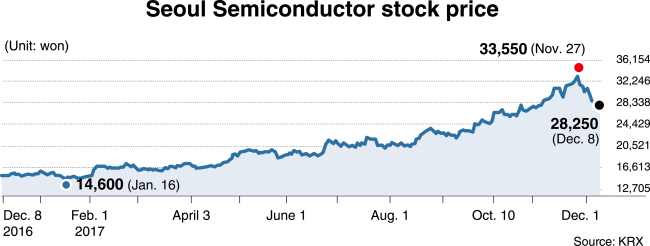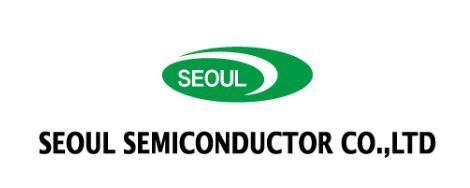[Kosdaq Star] Seoul Semiconductor unfazed by IT sell-offs
By Son Ji-hyoungPublished : Dec. 10, 2017 - 15:26
This is the 46th in a series of articles analyzing major companies traded on the tech-heavy Kosdaq market. -- Ed.
A tax cut in the US and the strong Korean won has negatively affected a tech rally on South Korean stock markets in the past couple of weeks. The Kosdaq-listed light-emitting diode maker Seoul Semiconductor was no exception, as its share price hit a record 33,550 won on Nov. 27, but backtracked to 28,250 won on Friday, falling 13.1 percent over the past two weeks.
But some analysts paint a bigger picture on the largest IT player and 17th-largest share on the Kosdaq with 1.64 trillion won ($1.5 billion) in market cap, citing its original technology and anticipation for increasing clout in the auto LED market.
Seoul Semiconductor is the developer of Acrich, which allow LEDs to run on alternating current power, as well as Wicop, which enables flexibility in LED design and cost savings.
With the exclusive technology the company holds as well as the prospects of the auto industry adding the latest tech features, foreign investors have been paying keen interest, analysts say.

Foreign investors held 18 percent of Seoul Semiconductor stocks as of Friday, up 0.5 percentage point in two weeks and fourfold from a year before.
This comes in contrast with those of tech giants. In the past two weeks until Friday, Samsung Electronics, SK hynix and LG Uplus saw foreign sell-offs of 1.4 trillion won, 1.2 trillion won and 1.1 trillion won, respectively.
Founded in 1987 and listed on the Kosdaq in 2002, Seoul Semiconductor, headquartered in Ansan, Gyeonggi Province, has shown lackluster stock market performance since late 2014 with the arrival of organic LEDs to replace LEDs for panels.
Seoul Semiconductor, a traditional supplier for TVs, switched targets to automotive headlamps that “carry high margins,” making use of its Wicop technology, according to an analyst.
A tax cut in the US and the strong Korean won has negatively affected a tech rally on South Korean stock markets in the past couple of weeks. The Kosdaq-listed light-emitting diode maker Seoul Semiconductor was no exception, as its share price hit a record 33,550 won on Nov. 27, but backtracked to 28,250 won on Friday, falling 13.1 percent over the past two weeks.
But some analysts paint a bigger picture on the largest IT player and 17th-largest share on the Kosdaq with 1.64 trillion won ($1.5 billion) in market cap, citing its original technology and anticipation for increasing clout in the auto LED market.
Seoul Semiconductor is the developer of Acrich, which allow LEDs to run on alternating current power, as well as Wicop, which enables flexibility in LED design and cost savings.
With the exclusive technology the company holds as well as the prospects of the auto industry adding the latest tech features, foreign investors have been paying keen interest, analysts say.

Foreign investors held 18 percent of Seoul Semiconductor stocks as of Friday, up 0.5 percentage point in two weeks and fourfold from a year before.
This comes in contrast with those of tech giants. In the past two weeks until Friday, Samsung Electronics, SK hynix and LG Uplus saw foreign sell-offs of 1.4 trillion won, 1.2 trillion won and 1.1 trillion won, respectively.
Founded in 1987 and listed on the Kosdaq in 2002, Seoul Semiconductor, headquartered in Ansan, Gyeonggi Province, has shown lackluster stock market performance since late 2014 with the arrival of organic LEDs to replace LEDs for panels.
Seoul Semiconductor, a traditional supplier for TVs, switched targets to automotive headlamps that “carry high margins,” making use of its Wicop technology, according to an analyst.

“Given that automotive LEDs carry high margins relative to other LEDs, 2018 earnings could outperform our and the market’s projections,“ John Park, an analyst at Daishin Securities, wrote in a note. ”Going forward, LED usage will increase as self-driving and electric vehicles replace conventional automobiles.”
The volume of yearly net profit is expected to surpass 1.1 trillion won to hit a record high, with operating profit to reach 104 billion won as of the end of 2017, according to a projection by Park
Also, the firm‘s net sales from the automotive and lighting market in 2017 is projected to jump 13.7 percent on-year, while accounting for over 50 percent of all net revenues this year, according to an estimate by Soh Hyun-cheol, an analyst at Shinhan Financial Investment.
In addition, Seoul Semiconductor‘s entry into Vietnam in February to build packaging lines that operated in May has contributed to strengthening price competitiveness. The firm also aims to establish a corporation there as early as next year.
“Cost improvement can be expected given savings in corporate tax and labor cost of the LED packaging line in Vietnam,” wrote Soh.
Moreover, the relentlessly robust fundamentals in the IT sector at home and abroad, including Seoul Semiconductor, will accelerate investors’ hunt for low price stocks, despite “rapid style rotation,” that turned investor attention away from the IT sector, wrote Kim Yoon-seo, an analyst at Shinhan Financial Investment.

Lee Chung-hoon, a technician who took over Seoul Semiconductor in 1992, currently owns 16.72 percent of Seoul Semiconductor.
By Son Ji-hyoung
(consnow@heraldcorp.com)
The volume of yearly net profit is expected to surpass 1.1 trillion won to hit a record high, with operating profit to reach 104 billion won as of the end of 2017, according to a projection by Park
Also, the firm‘s net sales from the automotive and lighting market in 2017 is projected to jump 13.7 percent on-year, while accounting for over 50 percent of all net revenues this year, according to an estimate by Soh Hyun-cheol, an analyst at Shinhan Financial Investment.
In addition, Seoul Semiconductor‘s entry into Vietnam in February to build packaging lines that operated in May has contributed to strengthening price competitiveness. The firm also aims to establish a corporation there as early as next year.
“Cost improvement can be expected given savings in corporate tax and labor cost of the LED packaging line in Vietnam,” wrote Soh.
Moreover, the relentlessly robust fundamentals in the IT sector at home and abroad, including Seoul Semiconductor, will accelerate investors’ hunt for low price stocks, despite “rapid style rotation,” that turned investor attention away from the IT sector, wrote Kim Yoon-seo, an analyst at Shinhan Financial Investment.

Lee Chung-hoon, a technician who took over Seoul Semiconductor in 1992, currently owns 16.72 percent of Seoul Semiconductor.
By Son Ji-hyoung
(consnow@heraldcorp.com)








![[KH Explains] How should Korea adjust its trade defenses against Chinese EVs?](http://res.heraldm.com/phpwas/restmb_idxmake.php?idx=644&simg=/content/image/2024/04/15/20240415050562_0.jpg&u=20240415144419)











![[Today’s K-pop] Stray Kids to return soon: report](http://res.heraldm.com/phpwas/restmb_idxmake.php?idx=642&simg=/content/image/2024/04/16/20240416050713_0.jpg&u=)